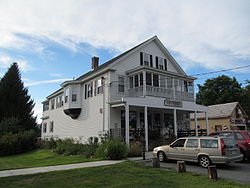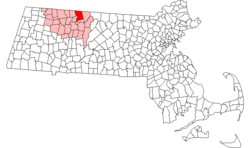Northfield, Massachusetts
| Northfield, Massachusetts | ||
|---|---|---|
| Town | ||

Mim's Market
|
||
|
||
 Location in Franklin County in Massachusetts |
||
| Coordinates: 42°41′45″N 72°27′12″W / 42.69583°N 72.45333°WCoordinates: 42°41′45″N 72°27′12″W / 42.69583°N 72.45333°W | ||
| Country | United States | |
| State | Massachusetts | |
| County | Franklin | |
| Settled | 1673 | |
| Incorporated | 1723 | |
| Government | ||
| • Type | Open town meeting | |
| Area | ||
| • Total | 35.4 sq mi (91.6 km2) | |
| • Land | 34.3 sq mi (88.8 km2) | |
| • Water | 1.1 sq mi (2.8 km2) | |
| Elevation | 300 ft (91 m) | |
| Population (2010) | ||
| • Total | 3,032 | |
| • Density | 86/sq mi (33/km2) | |
| Time zone | Eastern (UTC-5) | |
| • Summer (DST) | Eastern (UTC-4) | |
| ZIP code | 01360 | |
| Area code(s) | 413 | |
| FIPS code | 25-47835 | |
| GNIS feature ID | 0619381 | |
| Website | www |
|
Northfield is a town in Franklin County, Massachusetts, United States. Northfield was first settled in 1673. The population was 3,032 at the 2010 census. It is part of the Springfield, Massachusetts Metropolitan Statistical Area. The Connecticut River runs through the town, dividing West Northfield from East Northfield and the village of Northfield, where the town hall is located.
Part of the town is included in the census-designated place of Northfield.
Originally settled and inhabited by the Sokoki tribe, the area was the site of the village of Squawkeag. Northfield was first colonized in 1673 by the English and was officially incorporated in 1723.
The territory was successfully defended a number of times by Native Americans. As a result, the English colonists were occasionally taken north to Quebec, held as hostages by the French, causing the town to revert to American Indian control a few times. Eventually, conflicts with the Native American population ceased after most of the native population was displaced and/or sold into slavery as a result of King Philip's War and after a series of massacres of local Indian villages.
During Dummer's War, on August 13, 1723, Gray Lock raided Northfield, and four warriors killed two citizens near the town. The next day they attacked Joseph Stevens and his four sons in Rutland. Stevens escaped, two boys were killed, and the other two sons were captured.
Much of Northfield's development in the late nineteenth century was spurred by the work of evangelist Dwight Lyman Moody, a native of Northfield who established the Northfield Seminary for Girls in 1879 on a sweeping hillside in East Northfield. The school was the site of Moody's religious conferences, which attracted thousands of visitors to Northfield each summer. The influx of visitors led to the development of the town as a summer resort, especially after the opening of the Northfield Hotel in 1887. Francis Schell, a New York capitalist attracted by his interest in Moody's work at the Northfield Seminary, commissioned architect Bruce Price to design a summer home, which became known as the Northfield Chateau. Patterned after a French château but fanciful in style with prominent turrets and 99 rooms, the house fell into a state of disrepair following Schell's death, and it was demolished in 1967.
...
Wikipedia

